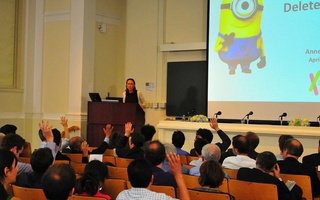Harvard Medical School Professor George M. Church was named the recipient of The Franklin Institute’s 2011 Bower Award and Prize for Achievement in Science yesterday for his contributions to genomic science, according to a press release.
“[Church was] fundamental in developing novel DNA sequencing technologies that supported the sequencing of the Human Genome,” said The Franklin Institute’s Vice President of Science and Innovation Frederic Bertley, also noting Church’s contributions to the field of synthetic biology in the form of creating organisms with artificial DNA.
As a Harvard graduate student, Church began working with multiplex sequencing, a process that speeds up the analysis of DNA. In 1995, Church founded the Personal Genome Project, which urges volunteers to donate blood samples for genomic sequencing. Church said he hopes that this database will provide information about personal risk of disease, physical traits, and ancestry to the general public.
“The PGP is an effort to get together an integrated database about everything you might want to know about a person,” he said.
Bertley emphasized the importance of personal genomic information in the treatment of diseases.
“Right now, we haven’t yet maximized the capacity to make personalized medicine a reality,” he said. “But we’ll get to that point through George Church and other scientists pushing the frontiers of genomics forward.”
Bertley added that he thought Church could “absolutely” be a candidate for a Nobel Prize. One hundred fifteen recipients of the Franklin Awards have won Nobels.
Church is one of seven recipients of The Franklin Institute’s 2011 award program, which originated in 1824 and is one of the oldest comprehensive science award programs in the country. The $250,000 Bower Award and Prize for Scientific Achievement was added to the set of awards in 1988 and focuses on a different field of science each year. This year’s theme is genomics, Bertley said.
Church said he plans to continue his research in genomics.
“We’re trying to continue to bring down the price of reading and writing genomes, and we just got a grant from the NIH specifically to let us reprogram human cells both genetically and epigenetically,” he said.
The Franklin Institute awards ceremony will take place on April 28, 2011.
Read more in News
Harvard College Women’s Center Sponsors Lecture on Women in PoliticsRecommended Articles
-
Harvard-MIT Study Examines GrapheneGraphene—a one-atom-thick carbon complex—could be the key to a faster and cheaper method for sequencing DNA, according to a study published by Harvard and MIT researchers that was featured as the cover story in a recent issue of the journal Nature.
-
Genome Sequencing Reveals E. coli DiversityResearchers at the Harvard School of Public Health and the Broad Institute of MIT and Harvard have completed a whole-genome sequencing of the E. coli bacterial strains responsible for the deadly 2011 outbreaks in Germany and France.
-
 23andMe Founder Discusses Genetics and Healthcare
23andMe Founder Discusses Genetics and Healthcare -
Mexican Billionaire Donates $74 Million to Broad for Disease ResearchMexican billionaire Carlos Slim Helú has donated $74 million to the Broad Institute to continue studying the genomic basis of human disease—the second gift he has given for this effort—according to an announcement made by Slim and Broad President and Director Eric S. Lander at the Broad Institute on Monday.













